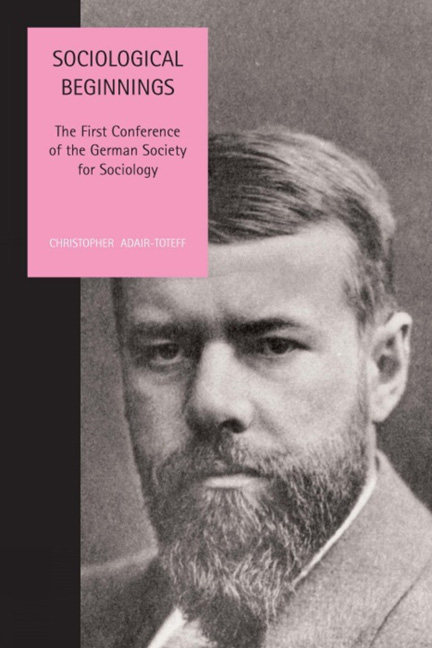Book contents
- Frontmatter
- Dedication
- Contents
- Preface
- A Note on Translation
- Chronology
- Short Biographies of the Main Participants
- Introduction
- The Papers of the First DGS Conference
- Georg Simmel – Sociology of Society
- Ferdinand Tönnies – Ways and Goals of Sociology
- Max Weber – Business Report followed by The Comparative Sociology of Newspapers and Associations
- Werner Sombart – Technology and Culture
- Ernst Troeltsch – Stoic–Christian Natural Law and Modern Profane Natural Law
- Select Bibliography
- Index
Ferdinand Tönnies – Ways and Goals of Sociology
from The Papers of the First DGS Conference
- Frontmatter
- Dedication
- Contents
- Preface
- A Note on Translation
- Chronology
- Short Biographies of the Main Participants
- Introduction
- The Papers of the First DGS Conference
- Georg Simmel – Sociology of Society
- Ferdinand Tönnies – Ways and Goals of Sociology
- Max Weber – Business Report followed by The Comparative Sociology of Newspapers and Associations
- Werner Sombart – Technology and Culture
- Ernst Troeltsch – Stoic–Christian Natural Law and Modern Profane Natural Law
- Select Bibliography
- Index
Summary
[Thursday Morning 20 October 1910
Presiding: Professor Dr F. Tönnies (Kiel–Eutin)
Honoured assembled members!
I have the honour herewith in the name of the Presidium to open the First
German Sociological Conference.]
Were it permissible to speak, as is common practice today, in the very comfortable style used in advertising, I would like to begin my speech with the words: ‘The future belongs to sociology’. However, I will be content with expressing the expectation and hope that ‘Sociology has a future’. However, I have not discussed its present state – because that would be much too big a theme – nor have I dealt with the matter of its possible future. But with your permission, I will pursue the ways and goals of sociology that are appropriate to the founding of our Society.
Sociology is first a philosophical discipline. As such, it is much older than its name. The name did not create it, nor did the person who coined the name bring it into being. Speculation about the essence of human society, especially political alliances, has always been closely connected with the ideas of ethical and good conduct of life and forms of life. Philosophers, who want to find the right way and to lead, should be guides to life. The development of theoretical sociology, which may also call be called ‘social philosophy’, is, then, inseparable from the history of legal philosophy. Consequently, it is also inseparable from the general doctrine of the state, from prosperity – in relation to which, in recent times, theories have emerged about the best way to conduct economic life; and these have branched off from their natural and legitimate connections, that is, the relationship between production, exchange and consumption. At the same time, we notice that all efforts at understanding these connections are slow and distance themselves only with difficulty from conscious motivations, in other words, from wishes, desires and practical ideas and tendencies. However, perhaps it is impossible to be fully and absolutely distanced from these conscious motivations. Everywhere in organic life there are oppositions: the normal and the abnormal; the physiological and the pathological; the healthy and the diseased; those who are living consciously and those who are declining.
- Type
- Chapter
- Information
- Sociological BeginningsThe First Conference of the German Society for Sociology, pp. 57 - 73Publisher: Liverpool University PressPrint publication year: 2005

